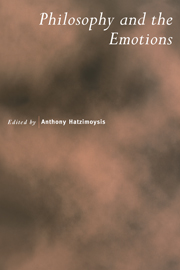Book contents
- Frontmatter
- Contents
- Preface
- Notes on Contributors
- I Emotions, Thoughts and Feelings: What is a ‘Cognitive Theory’ of the Emotions and Does it Neglect Affectivity?
- II The Emotions and their Philosophy of Mind
- III Basic Emotions, Complex Emotions, Machiavellian Emotions
- IV Emotion, Psychosemantics, and Embodied Appraisals
- V Emotions and the Problem of Other Minds
- VI Emotional Feelings and Intentionalism
- VII Emotions, Rationality, and Mind/Body
- VIII The significance of recalcitrant emotion (or, anti-quasijudgmentalism)
- IX The Logic of Emotions
- X Emotion and Desire in Self-Deception
- XI Emotion, Weakness of Will, and the Normative Conception of Agency
- XII Narrative and Perspective; Values and Appropriate Emotions
- XIII Passion and Politics
- XIV Don't Worry, Feel Guilty
- Index
II - The Emotions and their Philosophy of Mind
Published online by Cambridge University Press: 06 January 2010
- Frontmatter
- Contents
- Preface
- Notes on Contributors
- I Emotions, Thoughts and Feelings: What is a ‘Cognitive Theory’ of the Emotions and Does it Neglect Affectivity?
- II The Emotions and their Philosophy of Mind
- III Basic Emotions, Complex Emotions, Machiavellian Emotions
- IV Emotion, Psychosemantics, and Embodied Appraisals
- V Emotions and the Problem of Other Minds
- VI Emotional Feelings and Intentionalism
- VII Emotions, Rationality, and Mind/Body
- VIII The significance of recalcitrant emotion (or, anti-quasijudgmentalism)
- IX The Logic of Emotions
- X Emotion and Desire in Self-Deception
- XI Emotion, Weakness of Will, and the Normative Conception of Agency
- XII Narrative and Perspective; Values and Appropriate Emotions
- XIII Passion and Politics
- XIV Don't Worry, Feel Guilty
- Index
Summary
1. When I was invited by Yale University to deliver the Cassirer lectures, I hesitated for a topic. I wanted something new. I proposed the emotions, and at that time my knowledge of the topic was so slight that I didn't know whether it was something that I had already written on or not.
I mention this fact because one thing that I have since learnt about the emotions is that such ignorance is in order. For it is one of those topics where grasping the extension of the term is inseparable from having some theory of the matter, however primitive. One way to explain this fact is to invoke the novelty of the term, for, in the sense in which it is used in this lecture, it is only about 300 years old. Another way, probably related, is to point to the fact that, not only are there belief and particular beliefs, desire and particular desires, but, when we refer to particular beliefs and to particular desires, we call them ‘the belief that this’ or ‘the desire that that’. However there is no locution ‘the emotion that this’, or ‘the emotion that that’, which would indicate the presence of an emotion. It seems that ordinary language is an intermittent guide to the circumscription of the emotions.
However the uncertainty that I felt when I came to constructing a theory of the emotions went beyond anything I felt in demarcating the field of the emotions. For much of the time, I had the sense that I was engaged in work of pure improvisation.
- Type
- Chapter
- Information
- Philosophy and the Emotions , pp. 19 - 38Publisher: Cambridge University PressPrint publication year: 2003
- 2
- Cited by



